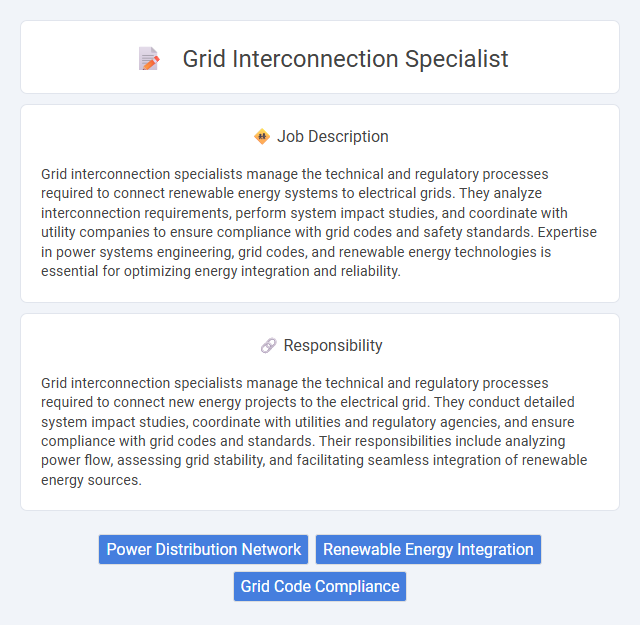
Grid interconnection specialists manage the technical and regulatory processes required to connect renewable energy systems to electrical grids. They analyze interconnection requirements, perform system impact studies, and coordinate with utility companies to ensure compliance with grid codes and safety standards. Expertise in power systems engineering, grid codes, and renewable energy technologies is essential for optimizing energy integration and reliability.
Individuals with strong analytical skills and a background in electrical engineering or renewable energy are likely suitable for a Grid Interconnection Specialist role. The job may require problem-solving under pressure and effective communication with utility companies, so candidates comfortable in dynamic environments might thrive. Those who prefer routine tasks or lack technical expertise may find this position challenging.
Qualification
Grid interconnection specialists require a strong background in electrical engineering, power systems, and grid infrastructure, often holding a Bachelor's or Master's degree in these fields. Proficiency in regulatory standards, such as IEEE 1547 and NERC compliance, and experience with utility interconnection processes are essential for ensuring seamless integration of distributed energy resources. Advanced skills in project management, system design software like ETAP or CYME, and effective communication with utility companies and stakeholders optimize performance and reliability of grid connections.
Responsibility
Grid interconnection specialists manage the technical and regulatory processes required to connect new energy projects to the electrical grid. They conduct detailed system impact studies, coordinate with utilities and regulatory agencies, and ensure compliance with grid codes and standards. Their responsibilities include analyzing power flow, assessing grid stability, and facilitating seamless integration of renewable energy sources.
Benefit
Grid interconnection specialists probably play a crucial role in ensuring the seamless integration of renewable energy sources into the power grid, which can lead to increased grid reliability and reduced operational costs. Their expertise likely contributes to optimized energy distribution, enhancing overall system efficiency and supporting sustainable energy goals. Employers may benefit from reduced downtime and improved regulatory compliance through the specialist's ability to navigate complex interconnection processes effectively.
Challenge
Grid interconnection specialists likely face challenges related to integrating renewable energy sources into existing power grids while ensuring stability and reliability. The role probably demands addressing complex regulatory requirements and coordinating with multiple stakeholders to manage interconnection agreements. Technical difficulties such as handling grid capacity constraints and mitigating potential disruptions may frequently arise in this position.
Career Advancement
Grid interconnection specialists play a crucial role in integrating renewable energy sources into electrical grids, ensuring seamless and efficient energy transfer. Career advancement opportunities include positions such as senior grid engineer, project manager, or energy systems consultant, often requiring advanced certifications like IEEE PES or Project Management Professional (PMP). Mastery in smart grid technologies and regulatory compliance enhances prospects for leadership roles in utility companies and renewable energy firms.
Key Terms
Power Distribution Network
Grid interconnection specialists manage the integration of renewable energy sources and distributed generation into existing power distribution networks, ensuring system reliability and stability. They perform detailed analyses of load flows, fault currents, and protection coordination to optimize grid performance and comply with regulatory standards. Expertise in smart grid technologies and advanced metering infrastructure allows these specialists to enhance grid resilience and support sustainable energy initiatives.
Renewable Energy Integration
A Grid Interconnection Specialist plays a critical role in integrating renewable energy sources with existing power grids, ensuring seamless connectivity and grid stability. They conduct technical assessments, develop interconnection solutions, and coordinate with utility companies to facilitate efficient integration of solar, wind, and other renewable generation. Expertise in grid codes, power system analysis, and renewable energy technologies is essential for optimizing performance and supporting sustainable energy transitions.
Grid Code Compliance
Grid interconnection specialists ensure electrical systems adhere to Grid Code Compliance standards, facilitating safe and reliable integration of renewable energy sources into the power grid. They analyze technical requirements, perform system studies, and coordinate with utilities to maintain synchronization, voltage stability, and fault ride-through capabilities. Expertise in regulatory frameworks and real-time monitoring tools is essential for optimizing grid performance and minimizing outages.
 kuljobs.com
kuljobs.com